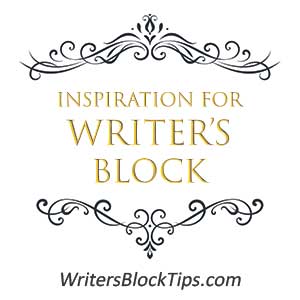Inspiration for Writer’s Block – How to Beat Writer’s Block
 Writer’s block is a common challenge that even the most seasoned writers face. It can strike at any time, leaving you feeling stuck, frustrated, and unsure of how to move forward. However, inspiration can often be the key to breaking free from creative stagnation. This article explores inspiration for writer’s block, sources and methods of inspiration that can help you rekindle your creativity.
Writer’s block is a common challenge that even the most seasoned writers face. It can strike at any time, leaving you feeling stuck, frustrated, and unsure of how to move forward. However, inspiration can often be the key to breaking free from creative stagnation. This article explores inspiration for writer’s block, sources and methods of inspiration that can help you rekindle your creativity.
Whether you’re a novelist, poet, essayist, or blogger, these approaches will help you tap into your imagination and reignite your passion for writing. Created by a former literary agent who’s helped 400+ authors get literary agents and/or traditional book publishers as an author coach/consultant, this article is part of a guide about How to Get Past Writer’s Block.
Finding Inspiration in Everyday Life
The beauty of inspiration is that it can often be found in the mundane. Everyday life is full of rich details, interactions, and emotions that can fuel your writing.
- Conversations
Pay attention to the dialogues you hear around you. Whether it’s a snippet of a stranger’s conversation at a café or a heartfelt talk with a friend, real-life exchanges can spark ideas for characters, dialogue, or storylines. - Nature
A walk in the park, a hike in the mountains, or even a stroll through your neighborhood can provide inspiration. Observe the details: the way sunlight filters through trees, the sounds of birds, or the feeling of the wind against your face. These sensory experiences can evoke emotions and imagery that translate into powerful writing. - Personal Experiences
Reflecting on your own life can be a goldmine for inspiration. Think about moments that have shaped you, people who have influenced you, or places that hold meaning. Personal experiences often lend authenticity and depth to your writing.
The Power of Reading
Reading is one of the most effective ways to combat writer’s block and find inspiration. Immersing yourself in other writers’ work can spark new ideas and help you overcome creative hurdles.
- Diverse Genres
Explore genres you wouldn’t normally read. If you’re a fiction writer, try diving into non-fiction, poetry, or even graphic novels. A fresh perspective can trigger unexpected creative breakthroughs. - Literary Classics
Revisit the classics. Authors like Shakespeare, Austen, or Hemingway offer timeless lessons in storytelling, character development, and prose. - New Voices
Seek out contemporary authors or emerging writers whose styles differ from your own. Reading fresh voices can challenge you to experiment and step outside your comfort zone.
Art as Inspiration
Art in its many forms can be a powerful source of creativity for writers. Engaging with visual, auditory, or performance art can help you approach writing from a different angle.
- Visual Art
Visit a museum or browse online galleries. A painting, sculpture, or photograph can evoke a story or emotion that becomes the foundation of your writing. Try imagining the story behind a particular piece of art. - Music
Music has the power to evoke emotions and transport you to another time or place. Create a playlist that matches the mood of what you’re trying to write, or listen to songs that inspire a particular character or scene. - Theater and Film
Watching a play, movie, or even a dance performance can inspire your narrative structure, dialogue, or themes. Pay attention to how characters interact, how conflict is resolved, or how visuals enhance storytelling.
Travel and Exploration
Sometimes, stepping out of your usual environment is all you need to find inspiration. Travel can broaden your perspective and infuse your writing with fresh ideas.
- Local Adventures
You don’t need to go far to find inspiration. Explore a nearby town, a historical site, or a new coffee shop. Experiencing unfamiliar surroundings can help you see the world—and your writing—from a new vantage point. - Cultural Experiences
Attend cultural events, such as festivals, concerts, or art exhibits. Learning about different traditions, cuisines, or histories can inspire characters, settings, or themes. - Journaling Your Travels
While traveling, keep a journal to document your experiences. Describe the sights, sounds, smells, and emotions of each place. These notes can later serve as material for your writing.
Connecting with Other Writers
Writing doesn’t have to be a solitary activity. Connecting with other writers can provide encouragement, feedback, and fresh ideas.
- Writing Groups
Join a local or online writing group. Sharing your work and hearing others’ perspectives can give you new insights and motivate you to keep going. - Workshops and Conferences
Attend a writing workshop or conference to learn from experienced authors and network with fellow writers. These events often leave participants feeling energized and inspired. - Social Media Communities
Engage with writing communities on platforms like Twitter, Instagram, or Reddit. Follow hashtags like #WritersLife or #AmWriting to connect with others who share your passion.
Dreams and Imagination
Your own mind can be a rich source of inspiration if you allow yourself to dream and imagine freely.
- Daydreaming
Let your mind wander. Sometimes, the best ideas come when you’re not actively searching for them. Take a break and allow your subconscious to work its magic. - Dream Journals
Keep a notebook by your bed to jot down dreams as soon as you wake up. Dreams are often filled with vivid imagery and bizarre scenarios that can inspire unique stories or characters. - Imaginary Scenarios
Ask yourself “What if?” questions. What if humans could fly? What if animals could talk? What if a secret society controlled the weather? Let your imagination run wild.
The Role of Emotion in Inspiration
Emotions are at the heart of all great writing. Tapping into your own feelings—or empathizing with others—can unlock new layers of creativity.
- Personal Reflection
Write about your current emotional state. Whether you’re feeling joy, sadness, anger, or confusion, channeling those emotions into words can help you process them and create something meaningful. - Empathy for Others
Imagine what it’s like to walk in someone else’s shoes. How does a single mother feel juggling work and family? What emotions run through an astronaut as they look back at Earth from space? Exploring these perspectives can lead to rich, authentic writing. - Emotional Triggers
Use music, movies, or memories to evoke specific emotions. For example, listen to a sad song or watch a heartwarming movie to get into the right mindset for writing.
Historical and Cultural Inspiration
History and culture offer a treasure trove of ideas for writers. By looking to the past or exploring different cultural perspectives, you can find stories waiting to be told.
- Historical Events
Research significant historical events and imagine them from a new angle. What was it like to be an ordinary person living through the French Revolution or the Civil Rights Movement? - Mythology and Folklore
Explore myths, legends, and folklore from around the world. These timeless tales often contain universal themes that resonate with readers. - Cultural Traditions
Delve into the traditions and customs of different cultures. From celebrations to rituals, these details can inspire unique settings, characters, or plotlines.
The Value of Solitude
While connecting with others is important, solitude can also be a powerful source of inspiration. Taking time to be alone with your thoughts allows you to reflect and recharge.
- Meditation
Practicing mindfulness or meditation can help you clear mental clutter and focus on your creative intentions. - Retreats
Consider going on a writing retreat or even a day-long solo trip. The change of scenery and uninterrupted time can do wonders for your creativity. - Silent Reflection
Spend time in silence, away from distractions like phones or social media. This quiet space often allows new ideas to emerge.
Conclusion – Writer’s Block Inspiration
Inspiration for writer’s block can come from countless sources—your daily life, other forms of art, the natural world, or even your own imagination. By exploring these avenues, you’ll discover that inspiration is everywhere, waiting to be tapped into. While writer’s block can feel insurmountable at times, seeking out inspiration in intentional ways can help you reconnect with your creativity and fall back in love with the art of writing.
Now that you’ve read “Inspiration for Writer’s Block,” click here to read “How to Avoid Writer’s Block.”

 This guide about
This guide about 